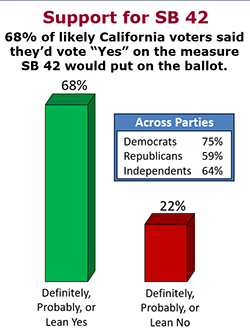For Californians who know all about the problems caused by
big money's influence on elections, finding the solution
remains easier said than done.
Limits on campaign donations have helped. But the U.S.
Supreme Court has knocked down such restrictions with its
rulings in the cases of Citizens United v. Federal Election
Commission, in 2010, and McCutcheon v. FEC, last April.
Another approach would be to require more complete
disclosure of campaign donations. Then, if the money can't
be capped, voters could at least know who's spending what
on which campaigns. But the California Legislature has been
reluctant to take that step.
Time and hope are running out for a state Senate bill that
would require advertisements for ballot measures to clearly
indicate who's paying for the ads.
Before a scheduled Assembly vote Saturday - on the final
weekend of the 2014 legislative season - California
residents must tell their representatives to support
it.
The bill, SB 52, by San Francisco-area Democrats Mark Leno
and Jerry Hill, is also known as the DISCLOSE Act. It
stands for Democracy is Strengthened by Casting Light on
Spending in Elections. At least the clever name reflects
its actual intent, unlike the names of many of the
nice-sounding political-action groups we hear promoting
this or that self-serving ballot measure.
SB 52 would do several things. It would require that state
ballot initiatives' and propositions' TV commercials
feature prominent disclosure of the top three funders of
the ads, and require similar disclosure in radio, robocall
and print advertising. The funders named would have to be
the people, organizations, corporations or labor unions
that provided the original funding, rather than "front"
groups.
That last requirement would seek to prevent outrages like
what happened before the 2012 California election, when an
Arizona nonprofit with anonymous backing dropped $11
million into two proposition campaigns - to try to buy
favor at the polls without showing their faces.
SB 52 took a long time to pass the Senate but finally did
in May 2013; among those voting no were Southern California
Sens. Bob Huff, Steve Knight and Rod Wright. Now it has
taken a long time to get to the Assembly floor, and since
it needs two-thirds approval because it's an amendment to
the Political Reform Act of 1974, it's far from a sure
thing to reach Gov. Jerry Brown's desk; in a recent
committee vote, one Democrat, Sebastian Ridley-Thomas,
voted no, and two others declined to vote.
Legislators tend not to like ballot-initiative backers;
thus, they went ahead this week and passed AB 400, which
requires initiative and recall petitions to identify
campaign donors.
But lawmakers like even less any change that makes
political professionals' jobs harder, which these
campaign-ad requirements certainly would.
Add to that the fact that SB 52 is generally opposed by
organized labor, and it's no mystery why Democrats in
Sacramento resist a bill that seems like a natural for
them.
The bill has the backing of Southern California Democratic
Assembly members Raul Bocanegra, Ian Calderon and Mike
Gatto. It needs more.
Tell your Assembly rep you want to know who's paying for
campaign ads - or know the reason why you can't.





